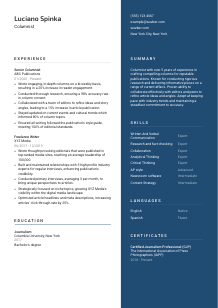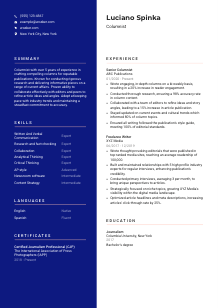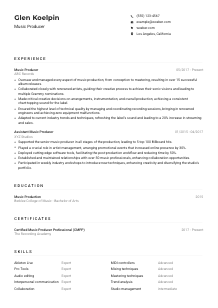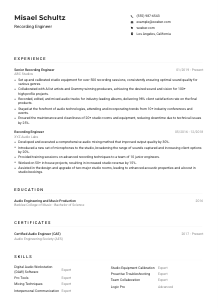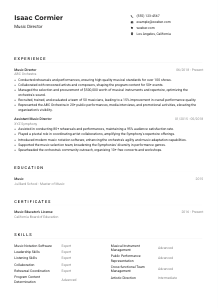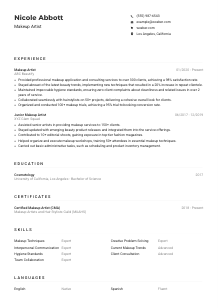Columnist CV Example
Weaving words, but your CV in knots? Dive into this Columnist CV example, composed with Wozber free CV builder. Unearth how to articulate your editorial mastery to match the tone and voice of coveted writing gigs, ensuring your career narratives are never cut short by a word count!
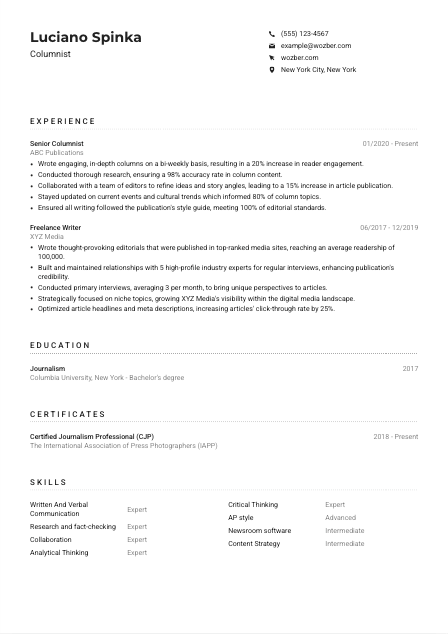
How to write a Columnist CV?
Hello, aspiring Columnist! In the dynamic world of journalism, your CV is the passport to your dream job. This guide, powered by Wozber free CV builder, is your roadmap to creating a CV that not only captures the essence of the Columnist profession but also sails smoothly through Applicant Tracking Systems (ATS). Get ready to weave your professional tale in a manner that highlights your editorial prowess and aligns perfectly with your targeted job description.
Personal Details
The 'Personal Details' segment is more than a formal introduction; it's your first handshake with potential employers. Perfecting this section is crucial for making a positive initial impact. Here, we'll delve into customizing this section specifically for the Columnist role, ensuring it resonates with the job's unique demands.
1. The Name Game
Think of your name as the headline of your story. Make sure it stands out by using a clean, professional font. The job title 'Columnist' positioned just below your name acts like a byline, instantly informing the hiring manager of your career aspirations.
2. Communication Channels
Provide your contact details, including a phone number and a professional email. A format like firstname.lastname@email.com sends a message of professionalism. If your role relies on an online portfolio or LinkedIn profile, include those links. Ensure they're up-to-date and echo the professionalism of your CV.
3. Location, Location, Location
Since the job description highlights the need for a New York City base, mention "New York City, New York," prominently. This alignment with the job's location requirement subtly assures the hiring manager of your availability and readiness.
4. Web Presence
A professional website or portfolio is invaluable for a Columnist. It offers a tangible showcase of your writing prowess and thematic range. If you maintain a blog or digital portfolio, ensure the URL is included, guiding potential employers to a firsthand experience of your work.
5. Pruning Unnecessary Information
Steer clear of including details such as age, gender, or marital status. Protecting your privacy mitigates the risk of bias, ensuring the focus remains on your qualifications and professional merits.
Takeaway
Your Personal Details section is your CV's headline; make it count. This is your initial step towards a dialogue with potential employers, so ensure it's crisp, professional, and aligned with the Columnist role. It's your first impression, make it compelling.





Experience
The Experience section is where you narrate your professional story, showcasing your evolution and achievements as a Columnist. Let's navigate through crafting this section with precision, ensuring every word demonstrates your suitability for the Columnist position.
- Wrote engaging, in‑depth columns on a bi‑weekly basis, resulting in a 20% increase in reader engagement.
- Conducted thorough research, ensuring a 98% accuracy rate in column content.
- Collaborated with a team of editors to refine ideas and story angles, leading to a 15% increase in article publication.
- Stayed updated on current events and cultural trends which informed 80% of column topics.
- Ensured all writing followed the publication's style guide, meeting 100% of editorial standards.
- Wrote thought‑provoking editorials that were published in top‑ranked media sites, reaching an average readership of 100,000.
- Built and maintained relationships with 5 high‑profile industry experts for regular interviews, enhancing publication's credibility.
- Conducted primary interviews, averaging 3 per month, to bring unique perspectives to articles.
- Strategically focused on niche topics, growing XYZ Media's visibility within the digital media landscape.
- Optimised article headlines and meta descriptions, increasing articles' click‑through rate by 25%.
1. Unpacking the Job Description
Carefully dissect the job description, identifying key aspects such as 'write engaging, in-depth columns' and 'conduct thorough research.' These phrases are your cues on what experiences to highlight.
2. Structuring Your Narrative
List your experiences in reverse chronological order. Begin with your most recent or current role. For each position, ensure you list the job title, the company's name, and your tenure there. This lays out your career trajectory clearly for hiring managers.
3. Telling Your Career Story
Under each role, detail accomplishments that mirror the job's responsibilities. If you've achieved a '20% increase in reader engagement,' make that a headline achievement. This demonstrates not just your ability to engage readers but also your keen sense of metrics and impact.
4. The Power of Numbers
Whenever possible, quantify your achievements. Numbers serve as concrete evidence of your impact and effectiveness. A '98% accuracy rate in column content' is a compelling testament to your meticulous research and fact-checking abilities.
5. Relevance is Key
Filter your experiences, only showcasing those that resonate with the Columnist role. While diverse experiences enrich your CV, prioritizing relevance ensures the hiring manager's attention is captured by your most pertinent accomplishments.
Takeaway
Think of the Experience section as your professional portfolio. Each bullet point is an opportunity to demonstrate your value and alignment with the Columnist role. Optimise your narrative to reflect the role's requirements, letting your career story resonate with prospective employers.
Education
For a Columnist, the Education section not only reflects your academic background but also your foundational knowledge in journalism and related fields. Let's examine how to mold this section to highlight your educational journey, aligning it with the job's criteria.
1. Matching the Degree Requirement
Start with the bedrock of the job description: a 'Bachelor's degree in journalism, English, or a related field.' Clearly listing your Journalism degree from Columbia University underscores your direct qualification for the role.
2. Simplify the Structure
Maintain clarity with a straightforward listing of your degree, the field of study, and the institution, followed by your graduation year. This direct approach allows hiring managers to quickly assess your academic credentials.
3. Degree Specificity
"Bachelor's degree in Journalism" should be prominently displayed, echoing the job description and ensuring immediate relevance. This mirroring technique helps in ATS optimisation, making your CV more likely to be picked up by automated scans.
4. Course Relevance
While not always necessary, mentioning significant courses or projects can be beneficial, especially if they directly relate to the nuances of column writing or in-depth research. This additional detail provides a deeper insight into your specific training and interests.
5. Academic Achievements
Highlight any honors, awards, or distinctions that differentiate you. This could include dean's list acknowledgments or participation in relevant clubs or societies. Such details enrich your profile, offering a more comprehensive view of your academic and extracurricular dedication.
Takeaway
The Education section of your CV is a pillar that supports your claim to the Columnist position. Reflecting on your relevant academic achievements not only aligns with the job requirements but also showcases the breadth of your knowledge and dedication to the field.
Certificates
In the fast-evolving field of journalism, certifications can serve as milestones of your commitment to staying abreast of industry standards and techniques. Tailoring this section for the Columnist role means highlighting certifications that reinforce your expertise and dedication.
1. Certificates That Speak Volumes
Although not explicitly demanded by our job description, a certification such as 'Certified Journalism Professional (CJP)' from The International Association of Press Photographers spotlights your commitment to professional excellence and ongoing learning.
2. Quality Over Quantity
Focus on listing certifications that resonate most with the Columnist role, ensuring they communicate your specialized skills and knowledge. This strategic selection keeps your CV focused and impactful.
3. Dates Do Matter
When your certification has a validity period or is a recent achievement, include this information. It provides hiring managers with a timeline of your professional development and current expertise.
4. Continuous Improvement
Journalism is a field that continually evolves with technology and societal shifts. Regularly updating your certifications and pursuing new ones demonstrates a proactive approach to your professional growth and adaptation.
Takeaway
Select certifications that sharpen your profile and speak directly to the Columnist role's demands. This segment of your CV highlights your journey of continuous learning and professional refinement. Positioned appropriately, it can make your application stand out.
Skills
The Skills section is a critical inventory of your competencies. For a Columnist, this means showcasing a blend of writing prowess, research capability, and technical know-how. This segment should be curated to align with the job description, enhancing the ATS optimisation of your CV.
1. Deciphering the Job Description
Analyze the job description for skills such as 'strong research and fact-checking skills' and 'excellent written and verbal communication skills.' These should be prominently featured in your skills section to reflect your tailored suitability for the role.
2. Matching and Displaying
Incorporate both hard and soft skills that you possess and which match those listed in the job description. Skills in 'AP style' and 'newsroom software' denote specific technical competencies, while 'analytical thinking' and 'critical thinking' reflect valuable cognitive abilities.
3. Concise and Clear
While it might be tempting to list every skill in your arsenal, focus on those most relevant to the Columnist position. This not only keeps your CV tidy but ensures the spotlight remains on your most pertinent competencies.
Takeaway
Your skills are the essence of your professional identity. By tailoring this section to reflect the Columnist role's demands, you highlight your readiness and alignment with the role. Each skill you list is a beacon of your capability and potential contribution.
Languages
In the realm of journalism, the fluency in multiple languages can be a formidable asset, allowing you to reach and resonate with broader audiences. For a Columnist, this means emphasizing language skills that enhance your capacity to engage with multicultural audiences.
1. Job Description Review
While the job description might not specify language requirements, reflecting on the publication's audience or the beats you aim to cover could reveal unspoken preferences. Listing language proficiencies makes your CV more versatile.
2. Prioritizing Languages
If specific languages can boost your application due to the publication's demographic or global reach, make sure these are listed upfront. Your fluency level should be clearly stated, offering a clear perspective on your communication capabilities.
3. Showcasing Your Palette
Beyond those explicitly valuable to the job, any additional languages you speak contribute to your profile's richness. They mark you as a globally aware individual, capable of engaging with diverse cultures and perspectives.
4. Clarity in Proficiency
Honesty about your language proficiency levels fosters trust. Whether 'native,' 'fluent,' 'intermediate,' or 'basic,' these terms offer a transparent assessment of your skills, setting realistic expectations for your capabilities.
5. Understanding the Role's Scope
In roles that involve varied cultural insights or global trends, demonstrating language proficiency can significantly bolster your application. It underpins your ability to navigate different narratives and connect with a wider audience.
Takeaway
Every language you know opens doors to new stories and perspectives, enriching your journalistic toolkit. Highlighting this aspect of your skill set showcases your preparedness for the diverse and interconnected world of journalism.
Summary
A compelling Summary section acts as the lead paragraph of your CV, drawing the reader in and encouraging them to explore further. For a Columnist, it's your chance to encapsulate your essence, showcasing your match for the role in a nutshell.
1. Understanding the Job
Start by absorbing the essence of the Columnist role as outlined in the job description. It's your guide to crafting a summary that resonates with the key responsibilities and required qualifications.
2. Crafting Your Lead
Begin with a statement that positions you within your profession and highlights your years of experience. 'Columnist with over 5 years of experience in crafting compelling columns for reputable publications' immediately establishes your credibility.
3. Incorporating Key Qualities
Detail your core competencies and achievements, especially those that mirror the job's requirements. Mentioning your 'proven ability to collaborate with editors' and 'adeptness at keeping pace with industry trends' directly targets the job specification.
4. Brevity is the Soul of Wit
Keep your summary concise and to the point. This segment should act as an appetizer, not the main course, enticing hiring managers to delve deeper into the document.
Takeaway
Your summary is the introductory paragraph that sets the tone for your Columnist CV, succinctly presenting your professional identity. Craft it with care, making it a compelling invitation to explore your candidacy further.
Launching Your Columnist Journey
As we wrap up this detailed walkthrough, remember that your CV is more than a document; it's a narrative of your professional journey. With Wozber's free CV builder at your disposal, including ATS-friendly CV templates and an ATS CV scanner, you're well-equipped to tailor your CV to the Columnist position. Embrace this opportunity to fine-tune your professional story and step confidently towards your next big role in journalism. Your story is waiting to be told; go forth and write your next chapter with conviction.

- Bachelor's degree in journalism, English, or a related field.
- Minimum of 3 years of experience in writing for a publication or in a freelance capacity.
- Strong research and fact-checking skills.
- Excellent written and verbal communication skills.
- Familiarity with AP style and newsroom software.
- Must be located in New York City, New York.
- Write engaging, in-depth columns on a regular basis.
- Conduct thorough research to ensure accuracy and provide readers with valuable insights.
- Collaborate with editors and other team members to refine ideas and story angles.
- Stay updated on current events and cultural trends to inform column topics.
- Ensure all writing follows the publication's style guide and meets editorial standards.






